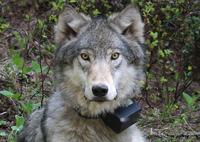Throwing Wolves to the Tea Party

By Robert Klavins. Rob is the NE Oregon Field Coordinator for Oregon Wild. He and his wife also own a working farm and bed & breakfast in rural Wallowa County.
For the first time in the better part of a century, a handful of wolves are howling in the wildlands of Western Oregon. For the fourth time in five years, the cattle industry and other interests hostile to wolf recovery are asking legislators to delist wolves from the protections of the state Endangered Species Act.
This time around one thing is different. Wolves are already delisted!
In a controversial decision, last fall, the Oregon Department of Fish and Wildlife (ODFW) voted 4-2 to delist wolves. In doing so, they ignored the public, troubling conflicts of interest, world-renowned scientists, and the law.
No one is above the law, and that includes public agencies like ODFW. In response, conservation groups including Oregon Wild asked for a legal review of the decision. Rather than allow that process to play out, a bill introduced by my Representative – the affable but ultra-conservative – Greg Barreto would sidestep the public’s right to hold public agencies accountable to their own laws by sidestepping that review.
Barreto’s bill goes further by undermining the agency’s authority under the wolf plan to consider re-listing wolves if their populations falter in the future. At last count, Oregon was home to eight known breeding pairs of wolves.
Like many progressives living in rural Oregon, I empathize with the concerns raised by those who frequently cite the rural-urban divide. My perspectives are rarely given serious consideration by those who represent me in Salem.
I also understand that the privilege of living near big wild places comes with the responsibility to co-exist with my neighbors. That includes the feathered, finned, and 4-legged kind. Even if concerns about wolves are often exaggerated, living with native wildlife can cause legitimate concerns. However, Barreto’s bill addresses none of these challenges. It’s all about catharsis.
Protections for wildlife, clean water, and healthy landscapes provide convenient scapegoats for decision makers trying to escape responsibility. But killing wolves, clearcutting forests, and devolving public lands to provincial interests won’t bring back the glory days of the 1980’s or the 1880’s.
For some, old prejudices die hard. But in the 21st century, most Oregonians see wolf recovery as a rare opportunity to right a historic wrong (as evidenced by the 96% of public comments in favor of wolf recovery). For wolves and the Nez Perce, the glory days were more likely the 1780’s.
We don’t always get second chances. Responsible stakeholders from Burns and Baker to Portland and Eugene are trying to find common ground and solutions that work for everyone. Barreto’s divisive legislation doesn’t help advance that cause.
The only reason it would be necessary is if ODFW violated existing law. For the legislature to weigh in on behalf of the 4% and change the law to let that happen would be terrible precedent for wolves, for wildlife, and for those of us who still believe in public process and playing by the rules.
|
Feb. 03, 2016
Posted in guest column. |
More Recent Posts | |
Albert Kaufman |
|
Guest Column |
|
Kari Chisholm |
|
Kari Chisholm |
Final pre-census estimate: Oregon's getting a sixth congressional seat |
Albert Kaufman |
Polluted by Money - How corporate cash corrupted one of the greenest states in America |
Guest Column |
|
Albert Kaufman |
Our Democrat Representatives in Action - What's on your wish list? |
Kari Chisholm |
|
Guest Column |
|
Kari Chisholm |
|
connect with blueoregon


